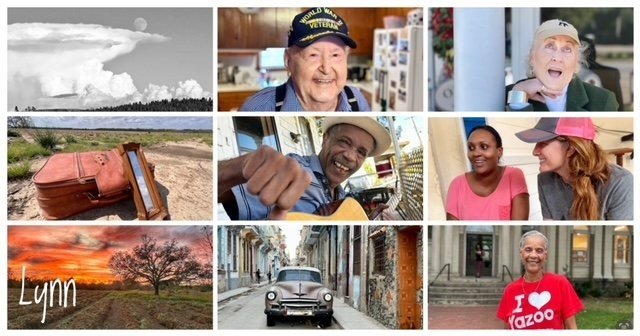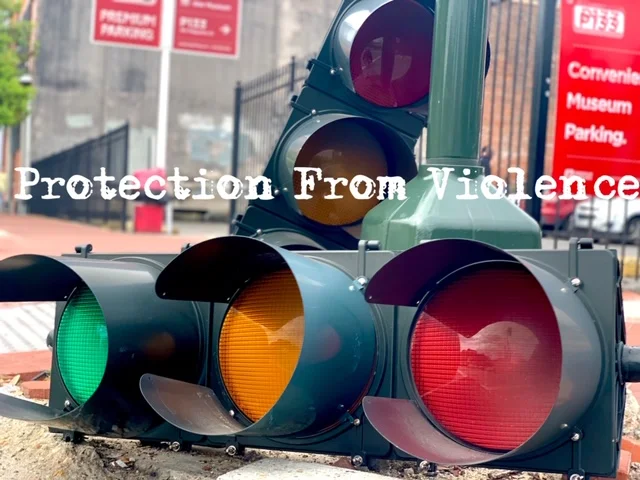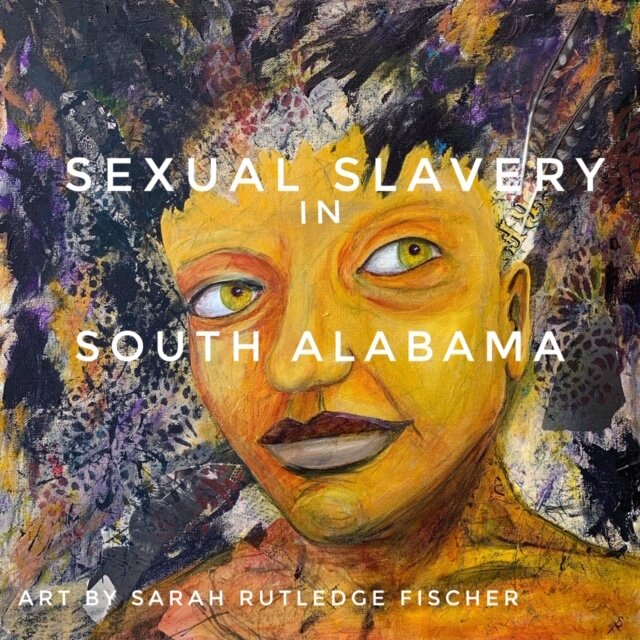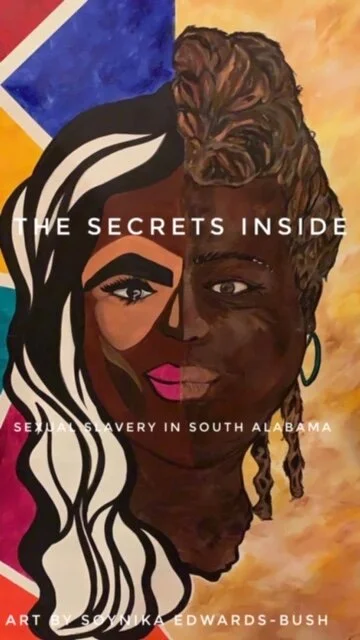Lenses
Prostitute. Hooker. Stripper.
"We have been looking at these girls through the wrong lens and we have never really seen them.”
Crystal Yarbrough said this in an interview for Our Southern Souls that became my introduction to sexual slavery in south Alabama.
"Sex trafficking is any sex act in exchange for anything of value," said Yarbrough. "Many prostitutes are victims of sex trafficking. If she has a pimp, she is a victim. We are quick to judge what she is doing without asking why she is doing it.”
During the first months of investigating sex trafficking, it was hard to find survivors to share their stories or law enforcement and prosecutors to acknowledge it is happening here. Searching along the edges provided a place to start. Motel housekeepers told of prostitutes asking for a few dollars for food because they couldn’t keep the money they made. They also warned of pimps sitting in cars and watching their girls at a motel down the street. A woman pushing a cart of towels, soap, and shampoo waited for the others to move on before talking about a bruised young girl she saw weeks before who looked nothing like the woman leading her into a room. "The girl looked scared and something didn't seem right," she said.
I stopped at gas stations along the interstates, asking cashiers if they suspected sex trafficking or saw things that didn’t look right. They all said “no.”
"I have seen a few things," said Donna, a middle-aged woman with her brown hair pulled back in a hairnet. She was sweeping the floor as I walked out of the gas station. "There are girls walking these streets and getting in cars all of the time. I used to be a stripper in the clubs and sex trafficking was happening there."
Pushing her glasses up her nose and leaning on the broom, Donna said she ran away at 16 because living on the streets couldn't be any worse than staying at home. She and her sister were sexually abused by their mother's boyfriend when they were little girls. Her mother dropped the edge of her bed onto her daughter’s long, blonde hair, forcing the girls to stay in one place while she went out with the man who raped them.
"He was a one-armed man and I will never forget his face," Donna said. “My grandparents took us in after that. My grandmother and all of my family were alcoholics. I grew into an angry teenager making things worse. Finally, I couldn't take it anymore and left. There were times I was homeless and slept in abandoned trailers. Men offered motel rooms for the night, but they always wanted something in return. That was also the year I started dancing in strip clubs. You do what you have to do to survive.”
Donna danced for 22 years, wearing a G-string and pasties while doing cocaine to stay awake and get through another night. Outsiders pushed drugs to make money off the girls, and the girls pushed drugs to make money off one another. In the beginning, dancing was freedom — Donna’s escape into her own world with lights, money, and attention.
"If you passed some of us on the streets, you wouldn't look at us or talk to us," Donna said. "In the clubs, men paid for our attention. It was an ego boost that didn’t last long because we were often expected to do more than we wanted. When you are treated as worthless, you begin to believe it. Girls died from overdoses and many of us have scars on our wrists and arms from our own attempts at suicide.
"Two Mobile cops propositioned me one night after their old ladies left,” she said. “I told them unless all of my tickets and everything I do in the future is off the record, it is not happening. Men from all positions came into the clubs. We were booked for parties for Mardi Gras Krewes. One party had hookers giving blow jobs in the corners and in the center of the room. I left early and never went to one of those parties again.”
Donna said some girls had pimps who picked up money several times a night. They were often a husband or boyfriend who met her in the club.
"They said 'I love you' and took all of the money," she said. "The pimps forced the girls to work and sometimes sat in the corner and watched. Girls covered up black eyes to keep working. Most pimps were mentally abusive because you aren't going to make money on a naked girl all bruised up. Sometimes a girl wouldn’t show up for a week or two because her pimp beat the hell out of her."
Donna said she never made less than $500 or $600 a night but has nothing to show for it. "I danced for over twenty years and wish I had saved that money for a house and a car, but I blew it all on partying," she said. "When you are in the clubs you only think about surviving today. Not what happens tomorrow or the future. I will be 46 on my birthday and I can't believe I made it this far.
"Women like me know how people look at us and what other women think of us, but it is time for us to tell our stories,” she said.
Donna introduced me to Traci, a friend and dancer from the clubs. Over a three-hour-breakfast at Waffle House, Traci told of being sexually abused by an uncle and getting married young to an abusive man who spent too much of his time and their money in the strip clubs A night of revenge and encouragement from dancers at the club to take the stage became one of the most exciting nights of her life. Making more money that night than she had ever made, she was “young and dumb and easily hooked.” Traci danced for 14 years, from 1996 through 2010, to support her two children. “It was all downhill from my first night,” she said.
She learned the tricks: make men pay more for doing less; guard your drink and pour it in the plants; dress like a schoolgirl for the biggest tips. She also learned to never trust a man in the club, no matter how much he spends or the price of the suits he wears.
It was a lesson she learned the hard way.
During the first months, an owner of a chain of restaurants in Mobile started coming into the club and gave Traci thousands of dollars just to sit beside him while he watched other women dance for him. One night he took Traci shopping and to dinner, saying he wanted to date her. They went to his mansion on the Eastern Shore and he slipped something into her glass of wine
"I woke up and I had been raped," she said. "He handed me my clothes and said, ‘Let’s go.’ There was nothing said or done about it. I was a stripper. Who was going to believe me or care? Men don’t see anything wrong with this behavior and society said I deserved it because I put myself in this situation. He paid for me and could do whatever he wanted with me, even rape."
Traci learned how to take the money, say no, and protect herself. Over the years she became a mentor helping the younger girls who were "getting screwed in the corner." She taught them how to keep it PG-rated most nights and go home with money and a clear conscience.
She said it was hard to feel human in a strip club where most dancers were mentally torn down and used drugs to do their job. She did them, too.
Most men were married with families and talked bad about their wives.
“Men treated us like body parts and wives looked down on us like we were the ones causing men to act this way,” Traci said. “No one sees the girl who got lost after childhood abuse or who is just trying to hang on and survive. We are considered disposable and no one bothers to find out why we do what we do."
Traci said most women who knew she was a stripper shunned or avoided her. “There was no hand reaching down to help,” she said. “There was no ear willing to listen.”
For many years Traci felt like trash and thought even God was embarrassed by her. She hit bottom and realized she was more than a stripper, she was a child of God, and it was time to do better for her kids. She called on God for help and got out.
"You can leave a hopeless, sad place and have a healthy life,” she said. “It is a hard ride back, but a lot of girls like me got out, got married, found good jobs, and are happy today."
Crystal was right. I used the wrong lens and saw any stripper or prostitute who was not Julia Roberts in Pretty Woman as immoral for choosing this life. Donna, Traci, and the other women who shared their stories helped turn my self-righteous lens into a mirror with a reminder that I have no room to judge.
Traci said years ago she never would have told her story, but she released the shame and has nothing to hide.
"We are equals who deserve compassion," she said. "I walked in the dark until I realized I was worthy of light and life.”
*These stories are from reporting for the “Sexual Slavery in South Alabama,” a six-part series currently running in Lagniappe. All stories from the series are available onlibe at www.LagniappeMobile.com
Donna’s name has been changed to protect her privacy






